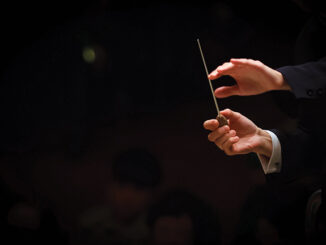
By the time you have picked up your September SOKY Happenings, Labor Day may already be something of the past. But Summer’s last official holiday always shows up right off the bat.
When I was classical music host in Detroit, Salt Lake City and more recently WKU Public Radio, I would look forward to late summer when I could begin to think about the weekend show. Invariably I found a treasure that proved to be rewarding, fun, varied and full of the unexpected. Also fulfilling were the side-trips into the world of folk ballads about work and occupations in the British Isles and the Maritime provinces among other places.
Although not necessarily ethnic, and yet they seemed to fit in depending on where in the program I placed them, were folks like Tennessee Ernie Ford complaining about “Sixteen Tons and What Do You Get?” and Merle Haggard singing “Working Man’s Blues.”
Peasants and factory workers are frequent characters in vocal music and opera. Twentieth-century labor movements inspired pieces including full symphonies by Shostakovich, Ginastera and Copland. And often, composers incorporated the actual sounds of labor in their works, like the “Anvil Chorus” in Verdi’s Il trovatore with its familiar anvil twacks, or Wagner’s “Cobbling Song” from Die Meistersinger von Nurnberg, which incorporates the steady beat of a hammer. Bizet’s popular opera Carmen tells the story of an honest working girl who gets in way over her head.
Other occupations in music include Rossini’s masterful opera buffa, The Barber of Seville. This two-act musical comedy was first performed over two hundred years ago. Two occupations are woven into the plot of Gilbert & Sullivan’s Pirates of Penzance – piracy, and the woes of a modern major general. Frederic, who, having completed his 21st year, is released from his apprenticeship to a band of tender-hearted pirates, meets the daughter of Major General Stanley, and the young people fall instantly in love.
As I said, writing about Labor Day music may be a little after the fact. Nevertheless I wanted to share some of my experiences while putting together programs about labor in classical music. Thanks to the staff of WQXR, New York City, for their survey taken in 2014, titled “Poll: Which Piece Captures the Spirit of Labor Day?” for the memory prompt.
Many composers have focused on the more poetic side of country living, work and dance, including many of the greats, like Mozart, Schubert, Grieg, Dvorak and Smetana. Others have striven to poetically evoke the American working spirit. Aaron Copland’s Fanfare for the Common Man and Virgil Thomson’s The Plow that Broke the Plains are good examples. The latter, a soundtrack for a 1936 documentary film about the Dust Bowl in the Great Plains, incorporates a number of American folk tunes.
Some years later, in 1987 and 2014, Joan Tower created her Fanfare for the Uncommon Woman, a series of six short pieces inspired by Copland’s Fanfare for the Common Man and employs, in fact, the same instrumentation. Joan Tower, herself an uncommon woman, is winner of three Grammy awards and founder of the De Capo Chamber Players.
Music about labor disputes is not very common, but Haydn’s “Farewell” Symphony (No. 45), could be counted in this category. The final movement is constructed in such a way that the orchestra members, one by one, quietly pack up their instruments, extinguish their candles and leave the stage. At the first performance Prince Esterhazy was left looking at an empty auditorium. The piece is said to have been a protest against the working conditions at Esterhazy’s residence.
But perhaps the most universal labor theme involves farm work. Robert Schumann wrote “The Happy Farmer” in his Album for the Young. Charles Wuorinen and Annie Proulx created an opera based on the cowboy story Brokeback Mountain. Alberto Ginastera often celebrated the work of Argentina’s ranch hands in Estancia, with “The Agricultural Workers.” This is a dark, driving dance inspired by the malambo, the country dance that appears in full force in the suite’s finale.
Maybe we could add J.S. Bach’s Peasant Cantata. Is this Bach, a “city slicker”, deriding his country cousins, or is this Bach extolling the contribution of labor and dedication?
-by Lee Stott
About the Author: Lee Stott is retired from WKU Public Radio, lives near Franklin with his daughter Cindy Wade’s family and has 30 grandchildren and seven great-grandchildren.




